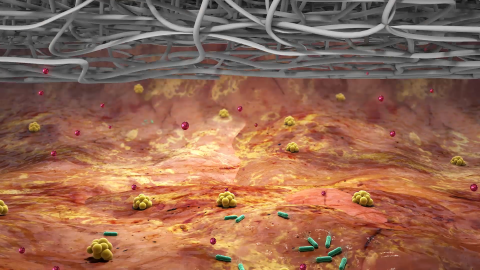

The materials are designed to manage and treat dermal ulcers, other chronic non-healing wounds and related skin conditions.
25 November 2020
2 min read
University of Portsmouth researchers have helped to develop new materials to combat infection and odour in chronic wounds.
The Design of Enabling Regenerative Materials (DERMA) project team also includes researchers from the Universities of Brighton and Ghent (Belgium) and the French healthcare tech-transfer agency, Eurasanté.
The project team have produced materials to tackle the problem of unpleasant wound malodour and materials designed to deliver antimicrobial agents to tackle wound infections with improved efficiency. The team also developed a new material that changes colour in the presence of bacteria.
If approved for future clinical use, this could enable the detection of emerging infections, allowing earlier clinical intervention, before the wound condition deteriorates.
The materials were designed for the management and treatment of dermal ulcers, other chronic non-healing wounds, and related skin conditions, to which elderly people and those with diabetes, are especially vulnerable.
This project addresses the challenge of improving the quality of life of an increasing elderly population, and other vulnerable groups.
Professor Joan Farrer, Associate Dean (Enterprise and Innovation) of the Faculty of Creative and Cultural Industries
The DERMA team hosted an online event to mark the end of the project last November, which featured a documentary film “Biomaterials in Action” describing the DERMA project and its results, followed by an interactive panel discussion with project collaborators and other experts in the field.
A multidisplinary team of Portsmouth researchers was involved in the project. Tom Clulee and Professor Joan Farrer from the Faculty of Creative and Cultural Industries (CCI) advised scientists on desirable material properties for difficult-to-dress areas of the body. Scientists from the Faculty of Technology tested and assessed the materials according to these parameters.
The University of Portsmouth Ageing Network (UPAN) hosted focus groups with patients, with clinical input from Portsmouth Hospitals University NHS Trust surgeons, to understand the problems associated with chronic wounds and identify the needs for the new dressing designs.
Health Psychologist Dr Miz Al Abeddy investigated the experiences of people with chronic wounds and Senior Research Fellow Dr Cressida Bowyer designed creative communication materials to promote the DERMA project to both expert and non-expert audiences.
CCI also produced a short film and two animations that feature in the documentary film, “Biomaterials in Action”.
Professor Farrer said: “This project addresses the challenge of improving the quality of life of an increasing elderly population, and other vulnerable groups. By addressing the needs of patients and clinicians, the materials are expected to provide a range of benefits. Patients may benefit from improved treatment and quality of life and healthcare providers could be enabled with better treatment options at lower cost.”
The DERMA project received E2.7m funding from the EU Interreg 2 Seas programme 2014–2020 co-funded by the European Regional Development Fund.
